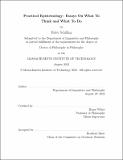Practical Epistemology: Essays on What to Think and What to Do
Author(s)
Schilling, Haley
DownloadThesis PDF (1.157Mb)
Advisor
White, Roger
Terms of use
Metadata
Show full item recordAbstract
Sometimes, we need evidence in order to act. A jury needs "proof beyond a reasonable doubt" in order to convict a defendant of a crime. A teacher needs to read a student’s essay in order to assign a grade. A babysitter needs to know that the sandwich does not contain peanuts, in order to give it to a child with a peanut allergy. The FDA needs "substantial evidence" of the efficacy of a new drug in order to approve it. This dissertation explores the relationship between ethics and epistemology, evidence and practical deliberation, and what to think and what to do.
Chapter 1 develops an account of “proof beyond a reasonable doubt,” a standard that is vexingly difficult to pin down. Legal proof is knowledge on the basis of trace evidence that the defendant is guilty. This epistemic norm generalizes to all of our responses and reactive attitudes — and is a challenge to orthodox knowledge norms.
Chapter 2 considers a central issue in the ethics of AI — algorithms are often opaque. This essay characterizes a class of applications for which there is a special moral demand for transparency: algorithms that give people what they deserve, on the basis of what they have done. Explainability is important to assure that the algorithms follow the requisite epistemic norms.
Chapter 3 considers the pragmatic encroachment thesis, the claim that whether S knows p depends on the practical, as well as the epistemic, features of her deliberative context. The essay argues that the ordinary knowledge ascriptions that often motivate the thesis can just as easily undermine thesis, and then develops a contextualist knowledge norm that can account for the data.
Chapter 4 explains how to set significance levels, based on practical considerations. Scientists should set significance levels based on the value of the posterior credences that would result from updating on different results of significance tests.
Date issued
2022-09Department
Massachusetts Institute of Technology. Department of Linguistics and PhilosophyPublisher
Massachusetts Institute of Technology